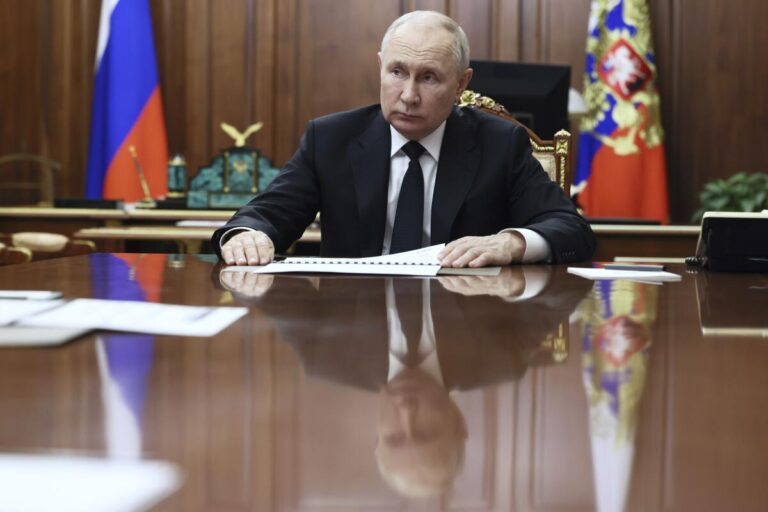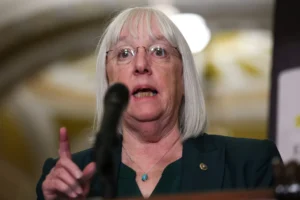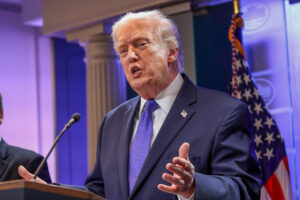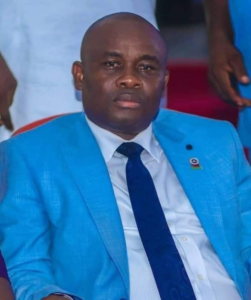Russia has issued carefully calibrated criticism of both sides in the war between Israel and Hamas. But the conflict also is giving Moscow bold new opportunities — to advance its role as a global power broker and challenge Western efforts to isolate it over Ukraine.
While Moscow lacks leverage to mediate a settlement in the Middle East, it could try to play on some perceived credibility problems with the West’s response to the crisis.
It also expects the Israel-Hamas war to distract attention from the fighting in Ukraine and erode support for Kyiv.
There are risks for Moscow, however. It could damage its relationship with Israel, which until now has kept it from sending weapons to Ukraine.
Russian President Vladimir Putin has condemned the Oct. 7 attack by Hamas militants on towns in southern Israel. At the same time, he warned Israel against blockading the Gaza Strip, likening it to Nazi Germany’s siege of Leningrad during World War II.
He has cast the war as a failure of U.S. diplomacy, charging that Washington has opted for economic “handouts” to the Palestinians and abandoned efforts to help create a Palestinian state.
Putin declared earlier this month that Moscow could play the role of mediator, thanks to its friendly ties with both Israel and the Palestinians, adding that “no one could suspect us of playing up to one party.”
Despite that claim of even-handedness, a U.N. Security Council resolution that Russia submitted last week condemning violence against civilians made no mention of Hamas. It was rejected by the council.
China was among a few countries that backed the Russian draft, reflecting a shared stance by Moscow and Beijing. Chinese and Russian Middle East envoys met last week to discuss working together to help cool the situation, noting their adherence to a two-state solution for Israel and the Palestinians.
While U.S. President Joe Biden, British Prime Minister Rishi Sunak and other Western leaders visited Israel to show support, Putin waited for nine days before calling Israeli Prime Minister Benjamin Netanyahu, even though they previously had developed warm personal ties. Putin also discussed the war in calls with the leaders of Egypt, Iran, Iraq, Syria and the head of the Palestinian Authority.
Putin offered Netanyahu condolences to the families of Israelis killed by Hamas and emphasized “his strong rejection and condemnation of any actions that victimize the civilian population, including women and children,” according to a Kremlin readout of the call. He also emphasized the need for a “peaceful settlement through political and diplomatic means,” it added. Netanyahu’s office said he told Putin that Israel would not stop until it had eliminated Hamas.
Unlike Putin, who carefully balanced his statements, other Russian officials were more blunt in their criticism of Israeli strikes on Gaza.
Konstantin Kosachev, deputy speaker of the upper house of Russian parliament, said that while Hamas unleashed the war, Israel’s response was “disproportionate” and “inhumane.”
The Kremlin’s maneuvering may reflect domestic politics, with Muslims making up about 15% of the its population. The Moscow-backed leader of Chechnya, Ramzan Kadyrov, spoke strongly in support of the Palestinians, assailing Israel for capturing their lands and establishing blockades.
Moscow’s stance won quick praise from Hamas, which said it appreciates Russia’s call for a cease-fire. Russia’s statements also play well in the Arab world, where many have accused the U.S. and its allies of squarely supporting Israel while turning a blind eye to the rising civilian death toll in Gaza.
But this position also threatens Russia’s friendly ties with Israel, which hasn’t joined Western sanctions against Moscow or given weapons to Ukraine.
“There is a real threat of exacerbation of our ties with Israel in the current situation,” said Andrei Kortunov, academic director of the Russian International Affairs Council.
The Times of Israel reported Tuesday an Israeli diplomat expressed “displeasure with the role Russia is playing” to Moscow’s diplomatic officials, voicing hope the Kremlin will take “more balanced” positions.
Amir Weitmann, a leading member of Netanyahu’s Likud party, accused Russia of supporting Hamas. Speaking on Kremlin-funded broadcaster RT, he warned that after Israel defeats Hamas, “we will make sure that Ukraine wins, we will make sure that you pay the price for what you have done.”
Asked about Israeli criticism of Moscow’s stance on the war, Kremlin spokesman Dmitry Peskov emphasized Russia’s condemnation of terrorism and reaffirmed its push for a quick cease-fire and the need for a Palestinian state.
Amid what Israel sees as Moscow’s pro-Palestinian stance, some prominent Russian voices have backed Israel.
In a sign of the split sympathies, the head of the most popular political talk show on Russian state TV, Vladimir Solovyov, fired one expert on his televised panel who alleged in an online interview that two of Moscow’s top diplomats have anti-Israeli sentiments.
Yevgeny Satanovsky, a pro-Kremlin foreign policy expert, described Russia’s Middle East envoy, Deputy Foreign Minister Mikhail Bogdanov, as leaning toward Arab countries and alleged that Foreign Ministry spokesperson Maria Zakharova detests Israel. He later apologized.



























